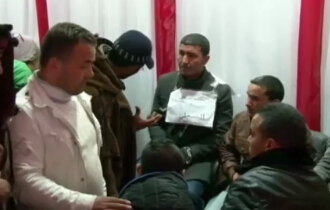Protests continue in Kasserine and several other Tunisian cities including the capital as people demonstrate against unemployment and the country’s dire economic situation.
在卡塞林和包括首都在內的其它幾個突尼斯城市抗議仍在繼續,人們示威反對失業和國家極其糟糕的經濟形勢。
A curfew has been in place since Tuesday in Kasserine, a poor central town of some 90,000 people, where clashes have been the worst, killing one policeman.
周二開始卡塞林就已經實行宵禁,貧困的中心城鎮有90,000人口,沖突使得情況更為糟糕并造成一名警察死亡。
The mood seems to evoke 2011, when exasperated Tunisians protested and kicked off the so-called Arab Spring.
情緒從2011年喚起,那時憤怒的突尼斯人開始抗議,拉開了所謂的“阿拉伯之春”。
People have taken to the streets anyway, defying the curfew.
人們不顧一切紛紛走上街頭違抗宵禁。

We are defending our right to work, the only way to be heard by the government is clashes; no other way. We have asked for five years but they have never answered.
我們正在捍衛工作的權利,政府的唯一途徑就是沖突,沒有其它的方式。我們已經要求五年了,但他們從來沒有回應過。
We are a family of eight people. Who is in charge? My sister! She works as a street cleaner despite having a university degree. Eight people have to live on her $110, can you imagine that? We rent a house, and the owner has tried to kick us out for three years. For me, sunrise is not a new hope.
我們一家有八口人。誰來養家糊口?我妹妹!她在街道當清潔工,盡管她有大學文憑。八個人靠她的110美元生活,你能想象嗎?我們租了一間房子,業主三年來一直想把我們趕出去。對于我來說,日出看不到希望。
Protesters tried to storm a police station and blockaded a government compound, and every sign or banner called for work, one saying “Jobs are the key to freedom”.
示威者試圖沖進警察局,封鎖一處政府大院,每一處標志或標語都在呼吁工作,一處標語說:“要自由先得有工作”。
Tunisia, like nearly every other country in the region, has seen its tourism industry decimated after terror attacks, and fear of more. With it accounting for so much of the economy, Tunisia is in trouble.
突尼斯幾乎像該地區的其它國家一樣,遭到恐怖襲擊后旅游業大量摧毀。因其是經濟的主要來源,突尼斯正陷入困境。
譯文屬可可原創,僅供學習交流使用,未經許可請勿轉載。











